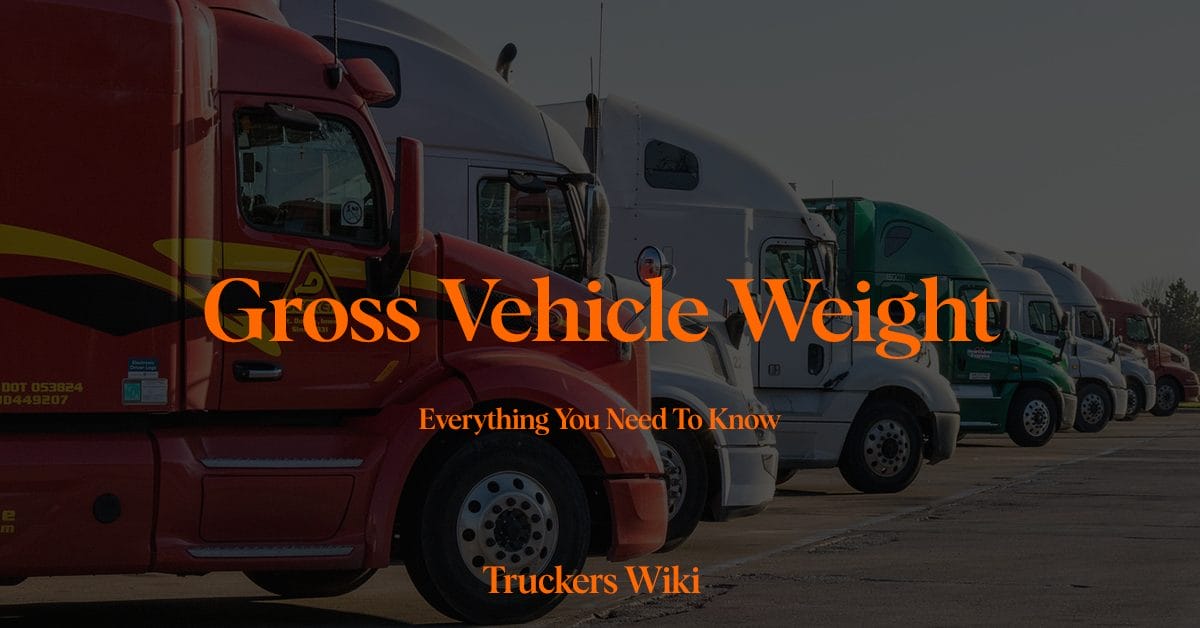
Table of Contents
What is Gross Vehicle Weight?
Gross Vehicle Weight (GVW) is the total weight of the vehicle, including everything from the vehicle itself to the passengers, cargo, and even the fuel in its tank.
What is The Gross Vehicle Weight Rating
The GVWR, or Gross Vehicle Weight Rating, is a critical specification set by vehicle manufacturers.
It’s the maximum total weight your vehicle is designed to handle safely.
This includes the weight of the vehicle itself, passengers, cargo, and any other additional load.
Adhering to the GVWR is vital for maintaining the vehicle’s structural integrity, ensuring safety on the road, and complying with legal regulations.
It’s a figure that every driver, especially in the trucking industry, should be well aware of.
Gross Vehicle Weight for Trucks Explained
Now, when we shift our focus to trucks, GVW becomes even more significant. It’s not just about the weight of the truck; it also encompasses the load it carries.
Whether it’s a small delivery truck or a large freight hauler, each has a specific GVW limit determined by its design and purpose.
Exceeding this limit can compromise the truck’s performance and safety, and get you in trouble with the law.
Eight GVWR Weight Classes
Light-Duty Trucks
Class 1: GVWR of 0 to 6,000 pounds
Class 2: GVWR of 6,001 to 10,000 pounds
Class 3: GVWR of 10,001 to 14,000
Medium-Duty Trucks
Class 4: GVWR of 14,001 to 16,000 pounds
Class 5: GVWR of 16,001 to 19,500 pounds
Class 6: GVWR of 19,501 to 26,000 pounds
Heavy-Duty Trucks
Class 7: GVWR of 26,001 to 33,000 pounds
Class 8: GVWR of 33,001 pounds or more
The GVWR of an 18-Wheeler
Speaking of big players in the trucking world, the 18-wheelers are the behemoths of the road.
Their Gross Vehicle Weight Rating (GVWR) is a key figure. It’s the maximum allowable weight, including the truck, its cargo, fuel, and even the driver. This rating ensures that the vehicle operates within safe weight limits.
Typically, the GVWR for these trucks can be as high as 80,000 pounds in the United States, depending on the configuration and purpose.
GVWR Meaning on Trailers
Let’s talk trailers now. You might have seen for example 7000 GVWR labeled on some. This means the trailer is designed to handle a total weight of 7000 pounds. This figure includes the weight of the trailer itself plus its load. It’s a crucial figure for safety and legal compliance, especially when hauling heavy loads like machinery, livestock, or construction materials.
The Importance of Adhering to GVWR
Why is it so important to stick to the GVWR? Well, safety is the primary concern. Overloading a vehicle can lead to increased wear and tear, braking difficulties, and even tire blowouts. Moreover, there are legal implications. Overloaded vehicles can lead to hefty fines and legal issues, especially if they’re involved in road accidents.
Where to Find GVWR
So, how do you calculate GVWR? GVWR is a specification determined and provided by the vehicle manufacturer.
If you need to calculate the front and rear axle this link will take you to a GVWR calculator.
However, if you’re looking to find the GVWR for a specific truck, there are several places where this information can usually be found:
Vehicle’s Door Frame Sticker
One of the most common places to find the GVWR is on a label or sticker located on the driver’s side door frame. This sticker, often called the vehicle’s compliance label, will list the GVWR along with other important information like tire size and pressure recommendations.
Owner’s Manual
The truck’s owner’s manual should have a section detailing the specifications of the vehicle, including the GVWR.
Google, Manufacturer’s Website or Customer Service
If you have the make and model of the truck, the manufacturer’s website often has detailed specifications for each model, including GVWR. Alternatively, contacting the manufacturer’s customer service can also provide this information.
Vehicle Registration Documents
Sometimes, the GVWR is listed on the vehicle’s registration documents.
VIN Decoder
You can also use this VIN decoder to find the information you need.
Learn about Weigh Station here.
Learn about Weight Ticket here.
Learn about Overweight Load here.
Learn about Highway Use Tax here.
Learn about Heavy Vehicle Use Tax (HVUT) here.
External Links
Last modified: February 5, 2024

